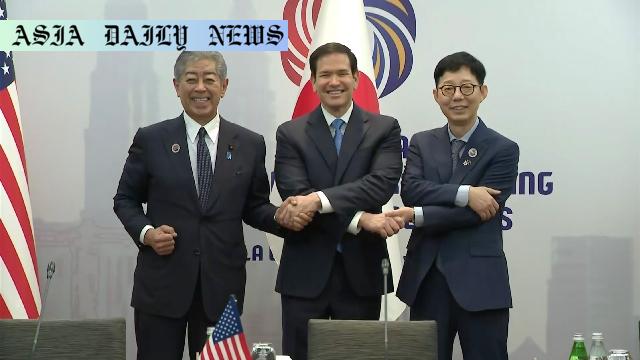Tripartite Talks: Senior diplomats from Japan, the US, and South Korea hold a pivotal meeting in Malaysia focusing on regional stability.
- Key Point 1: Senior diplomats from Japan, the US, and South Korea convened in Kuala Lumpur for regional security discussions.
- Key Point 2: Focus on tripartite unity to address North Korea’s nuclear programs and its collaboration with Russia.
- Key Point 3: Emphasis on countering cyber threats, including cryptocurrency theft.

Tripartite Diplomacy: A Step Toward Stability
The recent meeting among senior diplomats from Japan, the US, and South Korea in Kuala Lumpur signifies a significant moment in regional diplomacy. With tensions escalating in East Asia, the collaboration of these three nations is paramount. Held on the sidelines of the ASEAN ministerial meetings, this dialogue reinforces their joint commitment to stabilizing the region amid common challenges. Although the specific details of the conversation are still under wraps, the discussions most likely centered on enhancing cooperation within the region, particularly as geopolitical dynamics grow more intricate.
North Korea’s missile programs pose a persistent threat to stability, and this tripartite meeting likely reaffirmed their shared stance on this pressing issue. By consolidating their efforts, Japan, the US, and South Korea aim to send an unequivocal message that regional security remains non-negotiable. This meeting also demonstrates their willingness to sideline bilateral disagreements in favor of collective concerns.
Addressing Emerging and Persistent Threats
One of the major focal points of the tripartite meeting is undoubtedly North Korea’s increasing military cooperation with Russia. This developing partnership could have far-reaching implications for the security structures in place not only in East Asia but globally. Additionally, the issue of cyber activities, including cryptocurrency thefts linked to North Korea, highlights an evolving dimension of asymmetric threats. Addressing these cyber challenges requires a multi-pronged and united effort, underscoring how critical close coordination is in combating these looming risks.
A Reaffirmation of Unity Amid Challenges
While security concerns dominated the talks, the broader theme was the reaffirmation of unity between these three nations. Despite historical and political issues that occasionally strain Japan-South Korea relations, their alignment with the US demonstrates a pragmatic approach to current challenges. A united front improves not only their ability to address immediate security concerns but also strengthens their position in broader dialogues regarding stability in the Asia-Pacific region.
Conclusion
The tripartite meeting in Kuala Lumpur reinforces Japan, the US, and South Korea’s shared vision of regional stability. As North Korea’s actions continue to dominate security concerns, collaborating across cyber, military, and diplomatic fronts will continue to be integral to countering shared threats. This meeting serves as a reminder that when faced with critical challenges, collective diplomacy and unity can be powerful tools in navigating a complex security landscape.



Commentary
Strengthening Regional Unity
The tripartite meeting of Japan, the US, and South Korea in Malaysia marks an essential step toward fostering regional stability. In a world where unilateralism often dominates, it is refreshing to witness three major players coming together to discuss shared challenges. This unity becomes particularly critical given the rising threats posed by North Korea’s persistent development of nuclear weapons and the implications of its growing rapport with Russia.
Navigating Security Complexities
The regional security landscape in East Asia is undoubtedly intricate. While North Korea’s nuclear pursuits remain the centerpiece of concern, the emerging cyber threats, especially cryptocurrency thefts, showcase how diversely threat vectors are evolving. This highlights not only the need for diplomatic collaboration but also technological coordination. Shared intelligence and resources across the three nations are pivotal in countering these dangers effectively.
Unity Beyond Historical Challenges
It is important to recognize the broader significance of Japan and South Korea’s alignment, despite their historical grievances. By emphasizing collective diplomatic efforts with the US, these nations demonstrate a forward-looking approach, one that prioritizes mutual interests over past discord. Such pragmatic diplomacy can set an example for how nations with legacy disputes can still find common ground in tackling 21st-century challenges.
Conclusion
In essence, the discussions in Kuala Lumpur go beyond addressing immediate security concerns. They underscore the need for sustained collaboration and an emphasis on strengthening alliances to navigate an increasingly volatile world order. This tripartite meeting deserves to be seen as a testament to the power of diplomacy and unity in pursuing regional and global stability.